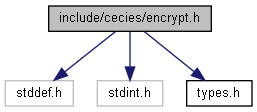ECIES encryption implementation using Curve25516 or Curve448, AES256-GCM and MbedTLS. More...
Include dependency graph for encrypt.h:

Go to the source code of this file.
Functions | |
| CECIES_API int | cecies_curve25519_encrypt (const uint8_t *data, size_t data_length, int compress, cecies_curve25519_key public_key, uint8_t **output, size_t *output_length, int output_base64) |
| CECIES_API int | cecies_curve448_encrypt (const uint8_t *data, size_t data_length, int compress, cecies_curve448_key public_key, uint8_t **output, size_t *output_length, int output_base64) |
Detailed Description
ECIES encryption implementation using Curve25516 or Curve448, AES256-GCM and MbedTLS.
Function Documentation
◆ cecies_curve25519_encrypt()
| CECIES_API int cecies_curve25519_encrypt | ( | const uint8_t * | data, |
| size_t | data_length, | ||
| int | compress, | ||
| cecies_curve25519_key | public_key, | ||
| uint8_t ** | output, | ||
| size_t * | output_length, | ||
| int | output_base64 | ||
| ) |
Encrypts the given data using ECIES over Curve25519 and AES256-GCM.
- Parameters
-
data The data to encrypt. data_length The length of the data array. compress Should the databe compressed before being encrypted? Pass any integer value between [0; 9] (where0is no compression at all and9is highest but slowest compression).public_key The public key to encrypt the data with (hex-string format, as is the output of cecies_generate_curve25519_keypair()). output Where to write the encrypted output into (this will ONLY be allocated if encryption succeeds; if the procedure fails in any way this is left untouched). On success: DO NOT FORGET TO FREE THIS YOURSELF! Use cecies_free() for freeing. output_length Where to write the output buffer length into. output_base64 Should the encrypted output bytes be base64-encoded for easy transmission over e.g. email? If you decide to base64-encode the encrypted data buffer, please be aware that a NUL-terminator is appended at the end to allow usage as a C-string but it will not be counted in output_length. Pass0forfalse, anything else fortrue.
- Returns
0if encryption succeeded; error codes as defined inside the header file or MbedTLS otherwise.
◆ cecies_curve448_encrypt()
| CECIES_API int cecies_curve448_encrypt | ( | const uint8_t * | data, |
| size_t | data_length, | ||
| int | compress, | ||
| cecies_curve448_key | public_key, | ||
| uint8_t ** | output, | ||
| size_t * | output_length, | ||
| int | output_base64 | ||
| ) |
Encrypts the given data using ECIES over Curve448 and AES256-GCM.
- Parameters
-
data The data to encrypt. data_length The length of the data array. compress Should the databe compressed before being encrypted? Pass any integer value between [0; 9] (where0is no compression at all and9is highest but slowest compression).public_key The public key to encrypt the data with (hex-string format, as is the output of cecies_generate_curve448_keypair()). output Where to write the encrypted output into (this will ONLY be allocated if encryption succeeds; if the procedure fails in any way this is left untouched). On success: DO NOT FORGET TO FREE THIS YOURSELF! Use cecies_free() for freeing. output_length Where to write the output buffer length into. output_base64 Should the encrypted output bytes be base64-encoded for easy transmission over e.g. email? If you decide to base64-encode the encrypted data buffer, please be aware that a NUL-terminator is appended at the end to allow usage as a C-string but it will not be counted in output_length. Pass0forfalse, anything else fortrue.
- Returns
0if encryption succeeded; error codes as defined inside the header file or MbedTLS otherwise.